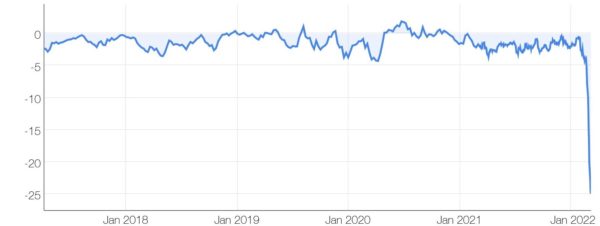Co-author of Ilona Sologub at VoxUkraine
Before Putin began threatening the world with nuclear weapons, he used gas and oil as a geopolitical weapon. Indeed, Russia has cut off (or threatened to cut off) entire countries from power supplies if those countries do not follow Moscow’s orders.
In recent history, Ukraine was disrupted in 2006 and 2009. In retrospect, it is shocking that Germany and other EU countries have been forgotten by this insane blackmail and are now on the hook at a pivotal point in history. Russia can bomb cities in Europe and faces little reaction from the EU because the EU is so dependent on Russian energy. A Russian economist has noted that even if Russia occupies Finland, Europe will continue to buy Russian gas.
It is immoral to buy energy from Russia or other regimes that kill innocent people. To add insult to injury, the scale of Russia’s oil and gas flows to the EU is absurd. Andrius Kubilius, a member of the EU parliament, writes that a daily purchase of oil and gas from Russia is equivalent to offering Putin 100 new tanks – twice the number of tanks that the Ukrainian army can destroy in a day.
The US government has imposed sanctions on Russian energy imports and called on other countries to follow suit. If the EU and China join this effort, the disappearance of the Russian economy will be very rapid, forcing Putin to stop the aggressive war against Ukraine and negotiate peace.
In this case, there will be a temporary increase in energy prices, which can be mitigated by the use of oil currently floating in tanks and if the Gulf countries increase their supply (they can do this fairly quickly). Another short-term opportunity is the introduction of the “oil / gas for food” program – so that energy revenues can only be used to buy humanitarian goods.
However, this is an unlikely scenario. Images of growing destruction in Ukraine – Russia bombed a Mariupol maternal hospital and killed dozens of babies and expectant mothers – will likely spark a public protest in European democracies that will force governments to abandon Russian energy . Other countries may be less concerned about moral issues and thus continue to buy Russian oil and gas. However, even in this very sad but more realistic scenario, Russia will pay a high price.
First of all, many people believe that oil is a homogeneous good, but this is not entirely true. The oil can be heavy and light, sweet and sour. The transition from one type to another requires some investment and adjustments in oil refineries.
Second, oil must be transported from wells to customers. Russia’s oil pipelines to Europe (they carry small quantities of Russian oil exports) cannot be redirected. Tanks running between Russian and EU ports can be used to export oil to non-EU countries, but transporting oil from Russia to China or India will take much longer (especially if the Suez Canal is not available), thus limiting capacity. tank fleet. to transport oil. Using the rail is more expensive and capacity adjustment is difficult in the short term.
Third, Russia is used to being a monopolist in dealing with small buyers. In this scenario, you will have to deal with a monopsonist, ie a buyer who has market power. This means that Russia will get a less favorable agreement. For example, compared to the EU, China buys gas from Russia at lower prices.
Fourth, contracts between Russia and potential buyers are likely to be settled in a major currency (US dollar, euro, etc.), which makes these transactions vulnerable to financial sanctions. Even the recent 30-year gas contract between Russia and China provides that the euro will be used to offset transactions.
What will happen to the price of oil in this scenario? If oil is as volatile as many people think, world prices will not be affected too much and Russia could continue to benefit from oil exports. If the oil is not so fungible, there should be a wide spread between the Urals (a mixture of Russian oil) and other major types of oil, such as Brent or West Texas. Markets suggest that the latter is the case.
Shell’s infamous Russian oil purchase had a $ 30 / barrel discount. The chart below shows that this price difference is extremely unusual. The incidence of this reduction (i.e. who pays for it) remains to be seen in the long run, but by

